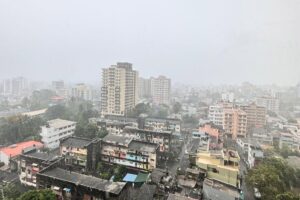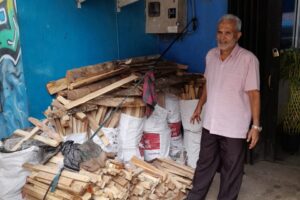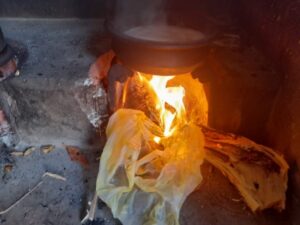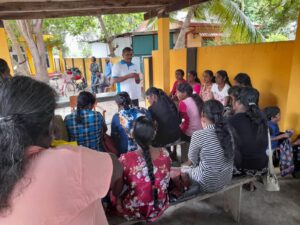July 26, 2023
Smog obscures the horizon in Colombo. (Photo: Waruna de Silva)
A combination of local and transboundary pollution was blamed for the drastic decline in air quality, which can cause serious respiratory ailments such as bronchitis, pneumonia, and the exacerbation of asthma. As a safety measure, the public was requested to wear face masks when stepping outdoors. Children, the elderly, and those with preexisting respiratory and heart conditions were advised to stay indoors and avoid prolonged outdoor activity.
Given the importance of this emerging challenge for Sri Lanka, The Asia Foundation conducted a study with Sri Lanka’s Industrial Services Bureau (ISB) to better understand GHG emissions from the transport sector, the industrial sector, and individual households. The study took stock of existing efforts to reduce carbon emissions and improve air quality through monitoring, awareness raising, and public policy discourse. It also noted legal bottlenecks and the need to change public perceptions, knowledge, and attitudes.
ISB conducted a literature review to fine-tune the design of the primary survey. The survey was followed by a series of household focus group discussions, key informant interviews, and a questionnaire for approximately 3,000 respondents in the industrial and transport sectors and private households.
The study found that 45 percent of household respondents in villages and 46 percent in cities believed that the air in their area was moderately polluted. The study also found that respondents were interested in taking action to improve air quality, with 55 percent saying that they would be willing to pay taxes for emissions controls and air quality improvements. Forty-two percent of respondents said they would agree to drive their own vehicle less for the sake of the environment. The results from the industrial-sector respondents were very different: 73 percent said that they were not willing to pay for air quality improvements.
Firewood continues to be Sri Lanka’s predominant household fuel. A majority of the country uses firewood as their primary domestic fuel source, including an estimated 34 percent of the urban population, 84 percent of the rural population, and 96 percent of the “estate” population, consisting primarily of tea plantation workers, of which there are roughly a million.
Field visits by ISB during primary data collection documented the improvised fuels that households use to light the hearth for cooking in the absence of firewood or other standard fuels. In the image below, a household fire is kindled with polythene plastic bags, a potent source of GHG emissions.
Just 14 of 480 survey respondents in the industrial and SME sectors—3 percent—said they were aware of the problem of GHG emissions and were actively trying to reduce them. Fifty percent of respondents said they had heard something about GHG emissions, but not much. This is quite alarming, because the industrial sector is one of the key contributors to GHG emissions.
A majority of household respondents (64 percent) had little or no knowledge of the importance of air quality. Thirty percent of respondents stated that air quality is very important to them because they understand environmental health standards, and 6 percent said that air quality in their area was not important to them. It is clear that at the household and community level there is a relatively little understanding of the issue of air quality.
As air pollution increases in Sri Lanka, government, industry, and individuals need to respond. The ISB study proposes several possible solutions to reduce GHG emissions in the transport and industrial sectors and at the household level. Gaps in the implementation of existing emissions policies must be closed. Better policy implementation in the transport sector and at the household level could significantly reduce air pollution—for example, by limiting the use of inappropriate materials for cooking. Public-private partnerships have great potential to develop collaborative solutions.
The study also calls for policy initiatives to raise public awareness about air pollution and create mechanisms to report violations like household burning of plastic waste. It recommends training government officials and NGOs in the “Green SME” concept of adopting green practices and developing green business models. It also recommends training in industrial development for officials who work predominantly with industries and SMEs.
The researchers noted that younger citizens seemed keen to engage in awareness programs, workshops, and other activities to give them the technical knowledge to reduce GHG emissions and develop solid-waste management models in villages. The Foundation’s long experience working with youth and providing tailored awareness and training programs makes this a potential avenue for future programming.
Taking immediate action to control emissions and reduce air pollution is vital to mitigating climate change. The Foundation encourages the use of this study to stimulate further discourse on the impact of GHG emissions in Sri Lanka and the need to collaborate for better air quality.
Erandi De Wass Gunawardena is a program officer, and Shannon Razack is a program associate, of The Asia Foundation’s Social Cohesion and Community Dialogue unit in Sri Lanka. They can be reached at erandi.gunawardena@asiafoundation.org and shannon.razack@asiafoundation.org, respectively. The views and opinions expressed here are those of the authors, not those of The Asia Foundation.






